Visiting the Taj Mahal or ordering a yummy curry? Then you need this free printable guide with common Hindi phrases for travel.
Travelling to India and want to learn some common Hindi phrases? You’re in the right place! You don’t have to learn the entire Hindi language to be travel fluent. Just being able to understand and use common Hindi phrases and expressions will make all the difference when it comes to comprehension. This travel phrase guide will introduce you to the Hindi language with details about its origin, where it’s spoken, and more importantly, how to understand and speak Hindi.
Just like all my other travel phrase cheat-sheets, this travel phrase guide full of useful phrases in Hindi includes practical phrases and vocabulary which will help you better understand its speakers and have more meaningful conversations and interactions. To help me create this guide, I asked my friend and Hindi teacher, Babita Craig from Babita’s School of Hindi to provide translations, transliterations, and audio clips to make the learning process easier.
Want to have fun whilst learning Hindi? Struggling to find decent Hindi language resources? I recommend getting uTalk. Available as a desktop site and app, uTalk is awesome for learning key words and phrases in Hindi, especially if you want to use it for travel purposes. It’s great for beginners getting started in a language and invaluable for intermediates looking to fill in gaps in their vocabulary and pronunciation.
What I love most about uTalk is that you can jump around their extensive library of topics and choose what you want to learn, when you want, and at your own pace. Because I believe in uTalk so much, I reached out to them and we’ve teamed up to offer you an exclusive 30% OFF reader discount across all of uTalk’s 140 languages! This offer isn’t available anywhere else! Click here to claim your exclusive 30% discount.
Let’s take a closer look at the Hindi language. Here’s what we’ll cover:
Table of Contents
Where is Hindi spoken?
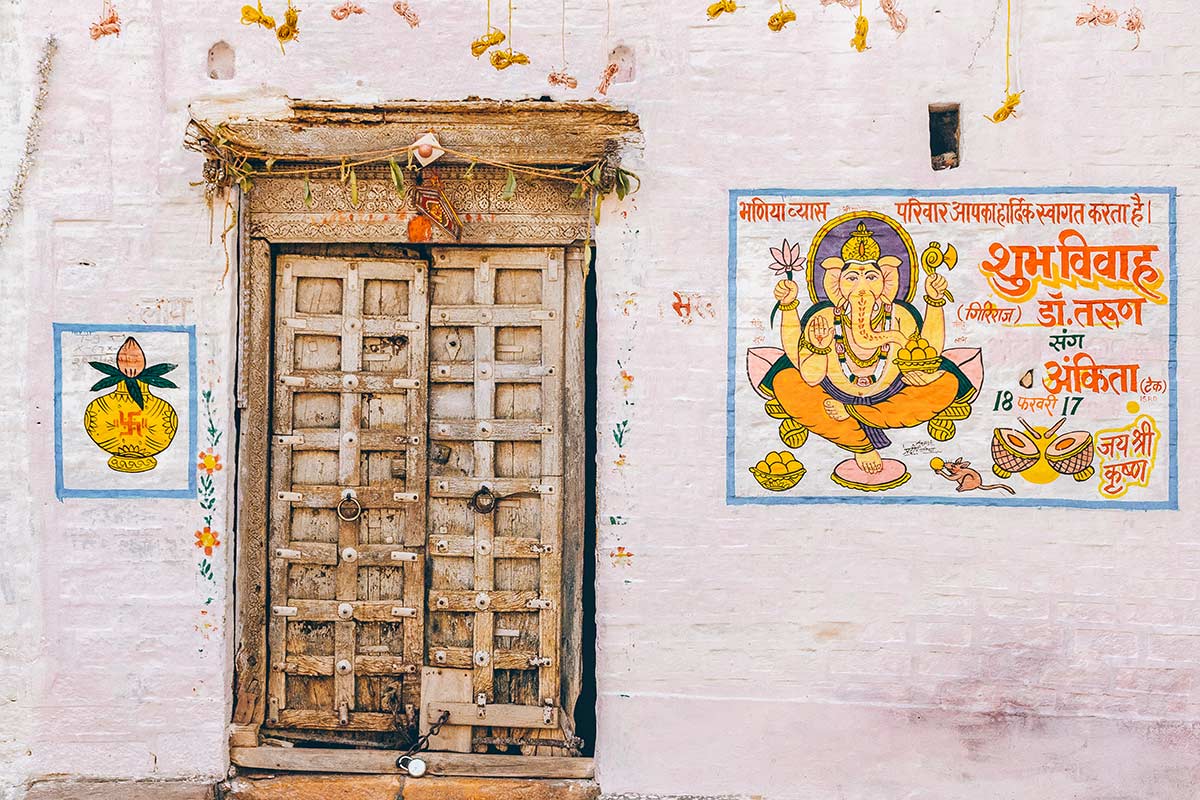 Hindi is one of two official languages in India, according to the Government of India’s Official Languages Act, along with English. It is spoken predominantly in Northern India, as well as being the lingua franca across many other parts of the country. However, Hindi is very often not people’s first language, as India has many different regional languages and dialects. Outside of India, Hindi is also spoken in countries such as Fiji, Nepal, Mauritius, Guyana, Suriname and Trinidad and Tobago.
Hindi is one of two official languages in India, according to the Government of India’s Official Languages Act, along with English. It is spoken predominantly in Northern India, as well as being the lingua franca across many other parts of the country. However, Hindi is very often not people’s first language, as India has many different regional languages and dialects. Outside of India, Hindi is also spoken in countries such as Fiji, Nepal, Mauritius, Guyana, Suriname and Trinidad and Tobago.
A quick history of the Hindi language
Hindi has its roots in the ancient Indo-Aryan language of Sanskrit; however, modern Hindi, as it is spoken today across India, is closely associated with Urdu, with the main differences being in how they are written and in the high-level vocabulary and culture on which they draw. For example, Hindi, like Sanskrit, is written in the Devanagari script, and is heavily influenced by Hindu culture and history, whilst Urdu, is written in a modified version of Persian, and uses many Persian and Arabic words. Modern Hindi has also taken on many English words, which you will hear used in its everyday spoken form.
The following sentence is a great example of this:
मेज़ पर पानी की बोतल है (mez par paanee kee botal hai) – The water bottle is on the table.
Here, the Hindi word for water is used (paanee), the Urdu word for table (mez) and the English word for bottle, albeit with a slightly different pronunciation.
How many people speak Hindi?
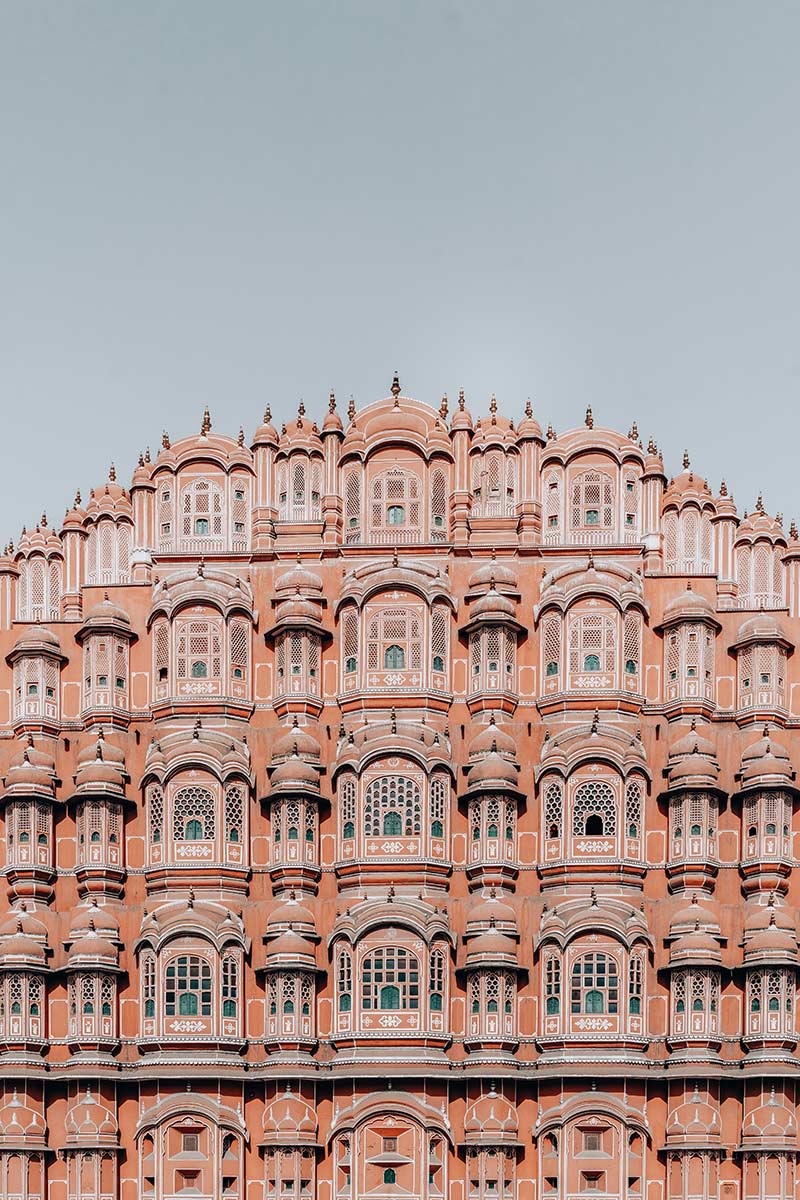 Depending on the source to which you refer, Hindi is either the third or fourth most widely spoken language in the world, and according to the BBC is spoken by approximately 425 million speakers as their first language and 120 million as a second language.
Depending on the source to which you refer, Hindi is either the third or fourth most widely spoken language in the world, and according to the BBC is spoken by approximately 425 million speakers as their first language and 120 million as a second language.
Hindi Alphabet
Hindi is written in the Devanagari script, which has 46 letters in total; 35 consonants and 11 vowels, as well as three conjunct letters (a combination of two consonants), which are commonly included.
Vowels
अ (a)
आ (aa)
इ (i)
ई (ee)
उ (u)
ऊ (oo)
ऋ (ri)
ए (e)
ऐ (ai)
ओ (o)
औ (au)
Consonants
Gutturals
क (ka)
ख (kha)
ग (ga)
घ (gha)
ङ (gn)
Palatals
च (cha)
छ (chha)
ज (ja)
झ (jha)
ञ (yn)
Cerebrals
ट (ta)
ठ (tha)
ड (da)
ढ (dha)
ण (na)
Dentals
त (dha)
थ (tha)
द (da)
ध (dha)
न (na)
Labials
प (pa)
फ (pha)
ब (ba)
भ (bha)
म (ma)
Semi-vowels
य (ya)
र (ra)
ल (la)
व (va)
Sibilants
श (sha)
ष (shha)
स (sa)
Glottal
ह (ha)
Flaps
ड़ (da)
ढ़ (dha)
Conjunct letters
क्ष (ksha)
त्र (tra)
ज्ञ (gya)
Hindi Pronunciation
Hindi is a phonetic language and is pronounced exactly as it is written. This is much simpler to do if you learn how to read the Devanagari script, for when Hindi is written in the Roman script (like English), there is no official, standardised way of doing so, meaning that pronunciations can vary.
One of the most common issues for speakers from a non-South Asian background is the pronunciation of the Hindi letters that are similar to a ‘t’ and ‘d’ in English. This is because there are four separate letters for both in Hindi, all of which are pronounced differently, with some being dental (where the tongue touches the teeth during pronunciation) and some cerebral (where the tongue touches the roof of the mouth during pronunciation).
Hindi Grammar
Although the grammar of Hindi and English is quite different, there is one general rule which will help you to remember how to put together a sentence. The verb is always found at the end of the sentence and the standard sentence construction is subject + object + verb.
You might also be pleased to learn that Hindi does not have determiners that precede nouns like those that you find in English, such as ‘a’, ‘an’ and ‘the’. However, before you celebrate, you should know that all Hindi nouns have an implied gender (masculine or feminine) – that put quite simply – you have no other option but to learn. On a positive note though, Hindi does not contain any punctuation, apart from ‘।’ which is the equivalent of a full stop.
Hindi False Friends
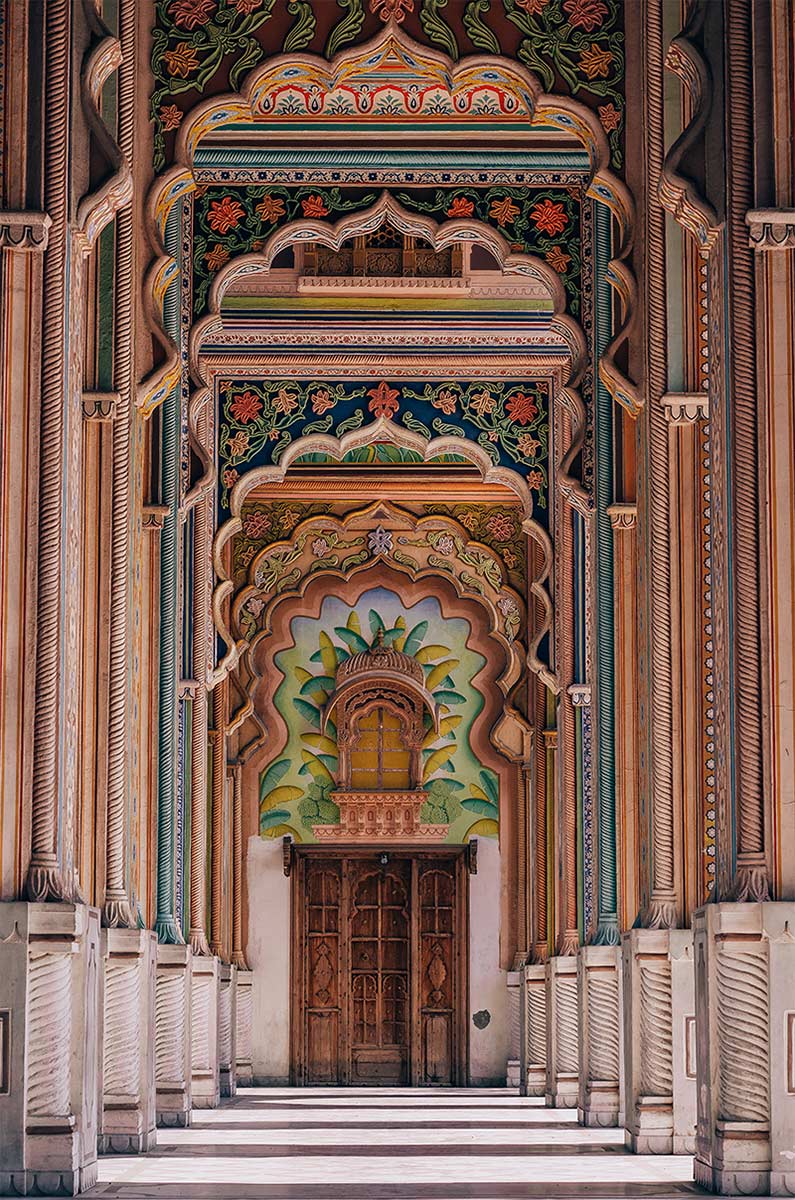 There are many words used in Modern Hindi that sound very similar to English words yet have a completely different meaning. These are known as ‘false friends’ and here are a couple that you might find useful!
There are many words used in Modern Hindi that sound very similar to English words yet have a completely different meaning. These are known as ‘false friends’ and here are a couple that you might find useful!
- सफ़र (safar) is the Urdu word for travel; however when pronounced it sounds just like the English word suffer.
- लू (loo) is the Hindi word for heatstroke but as you know this means something quite different in English.
Hindi words in English
As a result of Britain’s colonial past, there are also a number of Hindi words that are used in English. Here are a couple for you:
- डिंगी (dingee) – If you’re fortunate enough to take a trip on the river in India, you may find yourself setting foot onto a dinghy!
- लूट (loot) – The English word for loot is taken directly from the Hindi, which similarly means to steal, plunder or pillage.
Hindi Culture Travel Tips
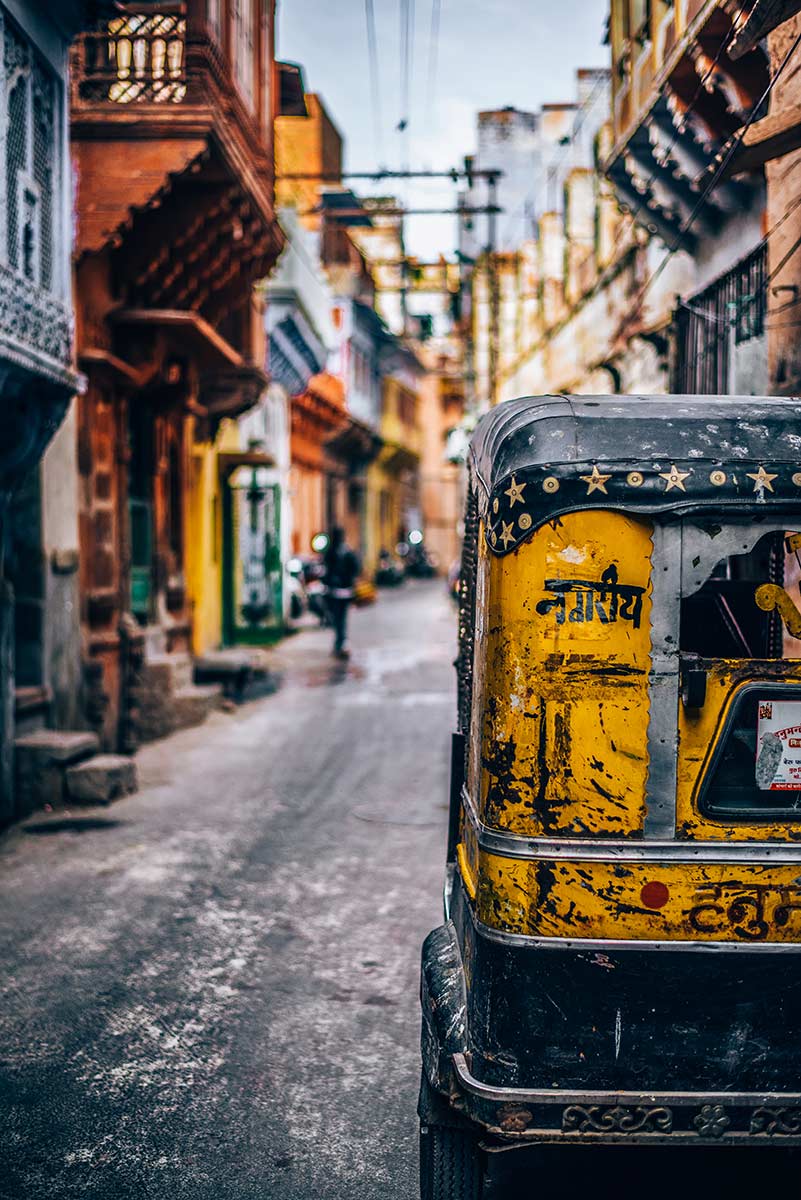 Whilst it is not particularly common for people to eat with their hands in Europe, it is culturally the norm in India, along with many other parts of the world, and there is an etiquette for doing so. Before visiting, why not read up on how to do this correctly.
Whilst it is not particularly common for people to eat with their hands in Europe, it is culturally the norm in India, along with many other parts of the world, and there is an etiquette for doing so. Before visiting, why not read up on how to do this correctly.
Also, don’t assume that everyone in India will speak or want to speak Hindi with you. Do some prior research on the places that you are visiting and be sensitive to the language and culture of the local population.
If you’re intending to travel to India for any length of time, spend some time getting used to sitting cross-legged on a couch or the ground. It is something that may bring back distant memories of a primary school assembly hall; however, there is nothing more uncomfortable and embarrassing than being invited for dinner at someone’s house and being unable to sit still for the whole evening and then not being able to get up at the end because your knees have locked solid!
Now, let’s take a look at some common Hindi phrases for travellers. NB: When the letter ‘n’ appears in brackets [n], that signifies that the letter before it is nasalised. The ‘n’ in brackets should not be pronounced.
209 Common Hindi Phrases for Travellers
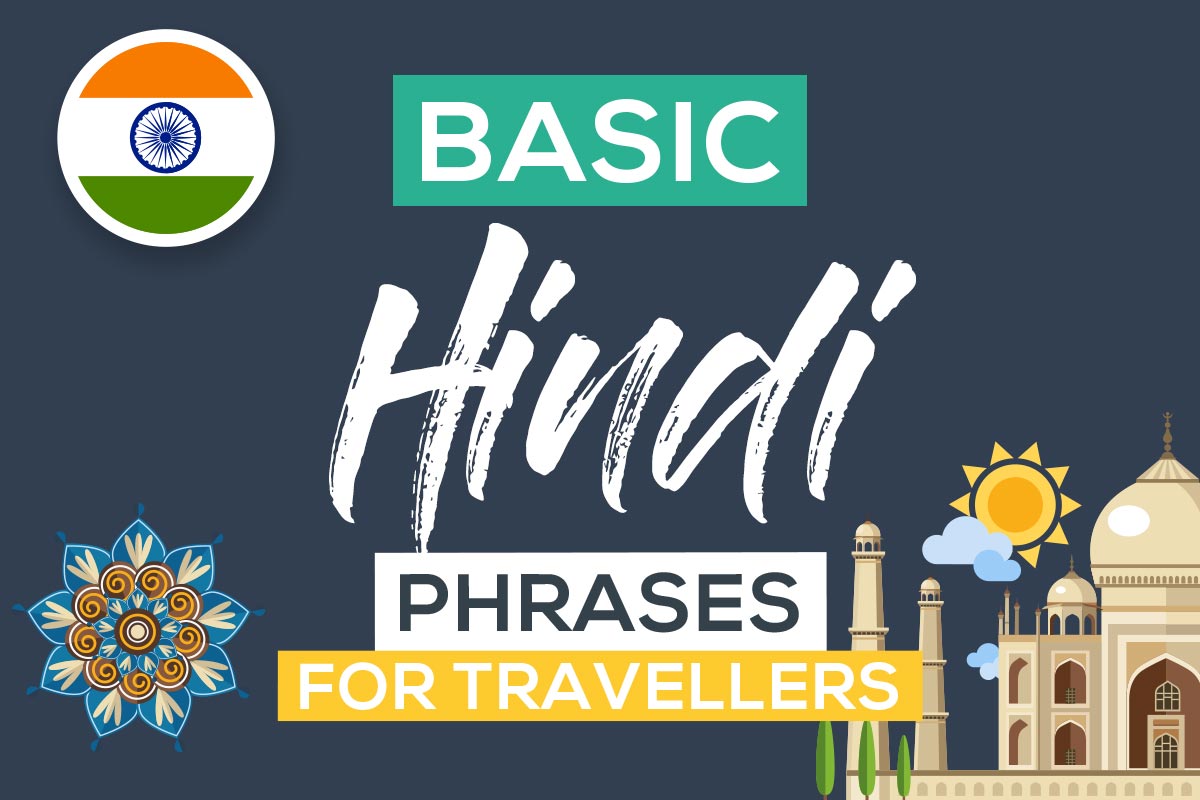 Want the infographic to take with you? Scroll to the bottom of the page.
Want the infographic to take with you? Scroll to the bottom of the page.
Greetings
1. Hello – नमस्ते (na-ma-sté)
2. Good morning – शुभ प्रभात (Shubh-pra-bhaat)
3. Good afternoon – नमस्ते (na-ma-sté)
4. Good evening – नमस्ते (na-ma-sté)
5. Good night – शुभ रात्रि (shubh-raa-tree)
6. Goodbye – नमस्ते (na-ma-sté)
7. See you – फिर मिलेंगे (phir milengé)
8. ‘Til next time – अगली बार तक (aaglee baar tak)
9. How are you? – आप कैसे हैं (aap kaisé hai[n])
10. Good – अच्छा (acchha)
11. So-so – ठीक-ठीक (theek-theek)
12. Not bad – ठीक-ठीक (theek-theek)
13. I’m not well – मैं ठीक नहीं हूँ (mai[n] theek nahee[n] hoo[n])
14. Good, thank you, and you? – मैं ठीक हूँ और आप? (mai[n] theek hoo[n] aur aap?)
15. What is your name? – आपका नाम क्या है? (aapka naam kya hai?)
16. My name is… – मेरा नाम _____ है। (mera naam _____ hai?)
17. Where are you from? – आप कहाँ से हैं? (aap kaha[n] sé hai[n]?)
18. I’m from [Insert name of city] – मैं _____ से हूँ (mai[n] _______ sé hoo[n])
19. I’m from [Insert name of country] – मैं _____ से हूँ (mai[n] _______ sé hoo[n])
20. I’m….American (m/f), English (m/f), Australian (m/f), Canadian (m/f) – मैं अमेरिकी हूँ / मैं अंग्रेज़ हूँ / मैं ऑस्ट्रेलियाई हूँ / मैं कनेडियन हूँ (mai[n] amerikee hoo[n] / mai[n] angrez hoo[n] / mai[n] austreliyaaee hoo[n] / mai(n) kanediyan hoo[n])
21. It’s nice to meet you – आप से मिलकर ख़ुशी हुई (aap sé milkar khushee hooee)
Greetings Audio
How to be Polite
22. Please – कृपया (krip-ya) NB: Please is usually implied in the verb – so this word is not commonly used.
23. Thank you – धन्यवाद (dhany-vaad)
24. Thank you very much – बहुत धन्यवाद (bahut dhany-vaad)
25. You’re welcome – आपका स्वागत है (aapka swaagat hai)
26. Yes – हाँ (haa[n])
27. No – नहीं (nahee[n])
28. That’s fine / ok – यह ठीक है (yeh theek hai)
29. Excuse me (to get attention) – सुनिए (Suniyé)
30. Excuse me (to get past someone) – माफ़ कीजिए (maaf keejiyé)
31. I’m sorry – माफ़ कीजिए (maaf keejiyé)
32. I don’t understand – मैं नहीं समझा (m.) / मैं नहीं समझी (f.) (mai[n] nahee[n] sam-jha (m.] / mai[n] nahee[n] sam-jhee (f.))
33. Do you speak English? – क्या आप अंग्रेज़ी बोलते हैं? (kya aap angrezee bolté hai[n]?)
34. I don’t speak Hindi – मैं हिंदी नहीं बोलता हूँ (m.) / मैं हिंदी नहीं बोलती हूँ (f.) – ((m.) mai[n] hindee nahee[n] bolta hoo[n] / (f.) mai(n) hindee nahee[n] boltee hoo[n].)
35. I only speak a little bit of Hindi – मैं सिर्फ़ थोड़ी-थोड़ी हिंदी बोलता हूँ (m.) / मैं सिर्फ़ थोड़ी-थोड़ी हिंदी बोलती हूँ (f.) (mai[n] sirf thodee-thodee hindee bolta hoo[n] (m.) / mai[n] sirf thodee-thodee hindee boltee hoo[n] (f.))
36. Can you please repeat that slowly? – क्या आप वह फिर से धीरे-धीरे बोल सकते हैं (kya aap woh phir se dheeré-dheeré bol sakté hai[n]?)
37. Maybe – शायद (shaayad)
38. I don’t know – मुझको मालूम नहीं (mujhko maaloom nahee[n])
39. I don’t think so – मैं ऐसा नहीं सोचता हूँ (m.) / मैं ऐसा नहीं सोचती हूँ (f.) (mai[n] aisa nahee[n] sochta hoo[n] (m.) / mai[n] aisa nahee[n] sochtee hoo[n] (f.))
40. Certainly! Of course! – ज़रूर बिल्कुल (zaroor / bilkul)
How to be Polite Audio
How to ask Questions
41. Where is …? ______ कहाँ है? (______ kaha[n] hai?)
42. Where are…? ______ कहाँ हैं? (______ kaha[n] hai?)
43. Where? – कहाँ? (kaha[n]?)
44. How? – कैसा? (kaisa?)
45. How much? – कितना? (kitna?)
46. Who? – कौन? (kaun?)
47. When? – कब? (kab?)
48. Why? – क्यों? (kyo[n]?)
49. What? – क्या? (kya?)
50. Which? – कौन सा / सी? (kaun sa/see?)
51. How much does this cost? – यह कितने का है? (yeh kitné ka hai?)
52. How much does that cost? – वह कितने का है? (woh kitné ka hai?)
53. Where is the toilet? – शौचालय कहाँ है? (shau-chaa-lay kaha[n] hai?)
54. I would like… –मुझको _____ चाहिए (mujhko _____ chaahiyé)
How to ask Ask Questions Audio
Eating Out & Ordering Food
55. Where is a good restaurant? – अच्छा भोजनालय कहाँ है? (acchha bhoj-naa-lay kaha[n] hai?)
56. What shall we make for you? – हम आप के लिए क्या बनायें? (hum aap ké liyé kya banaayé[n]?)
57. How many are you? – आप कितने लोग हैं? (aap kitné log hai[n]?)
58. Salad – सलाद (salaad)
59. Dessert – मिठाई / मीठी चीज़ (mithaa-ee) (sweets) / (meethee cheez) (sweet dish)
60. Drinks? पेय / ड्रिंक्स – (pey) (this is almost never used) / drinks – the English word is ordinarily used
61. Another one, please. – एक और दीजिए (ek aur deejiyé)
62. I would like… –मुझको _____ चाहिए (mujhko _____ chaahiyé)
63. The menu, please – मेन्यू दीजिए (menu deejiyé)
64. Two beers, please – दो बियर दीजिए (do biar deejiyé)
65. A bottle of wine, please – एक वाइन की बोतल दीजिए (ek vaain kee botal deejiyé)
66. Red wine – लाल वाइन (laal vaain)
67. White wine – सफ़ेद वाइन (safed vaain)
68. A bottle of still water – पानी की बोतल (paani kee botal)
69. A bottle of sparking water – सोडे की बोतल (sode kee botal)
70. What do you recommend? – आप क्या सलहा देंगे? (aap kya salha dengé?)
71. Is the sauce spicy? – क्या ग्रेवी तीख़ी है? (kya grevee teekhee hai?)
72. I’m allergic to… – मुझको _____ से अलेरजी है (mujhko _____ sé allergee hai)
73. I’m a vegetarian – मैं शाकाहारी हूँ (mai[n] shaakaahaari hoo[n])
74 The bill, please – बिल दीजिए (bill deejiyé)
75. Enjoy your food! – खाने का मज़ा लीजिए (khané ka maza leejiyé)
76. It was delicious! – खाना स्वादिष्ट था (khana swaadisht tha)
Eating Out & Ordering Food Audio
Getting Around
77. I’m(male) – मैं खो गया हूँ (mai[n] kho gaya hoo[n])
78. I’m lost (female) – मैं खो गयी हूँ (mai[n] kho gayee hoo[n])
79. I would like to go to… – मैं _____ जाना चाहता हूँ (m.) / मैं ______ जाना चाहती हूँ (f.) (mai[n] ____ jaana chaahta hoo[n] (m.) / mai[n] ____ jaana chaahtee hoo[n] (f.))
80. How do I get to… – मैं _____ तक कैसे जा सकता हूँ (m.) / मैं _____ तक कैसे जा सकती हूँ (f.) (mai[n] ____ tak kaisé ja sakta hoo[n] (m.) / mai[n] _____ tak kaisé ja saktee hoo[n] (f.))
81. Where is …? – _____ कहाँ है? (_____ kaha[n] hai?)
82. the bathroom – शौचालय (shau-chaa-lay)
83. the (train) station – (ट्रेन) स्टेशन (train station)
84. the shops – दूकान (dookaan)
85. the restaurant – भोजनालय (bhoj-naa-lay)
86. the museum – संग्रहालय (sangra-haa-lay)
87. the post office – डाक ख़ाना (daak khana)
88. the market – बाज़ार (baazaar)
89. the pharmacy – दवा की दूकान (davaa kee dookaan)
90. the hospital – अस्पताल (aspataal)
91. the bus stop बस स्टॉप (bus stop)
92. the airport – हवाई अड्डा (havaa-ee addaa)
93. the information office – सूचना कार्यालय (soochnaa kaar-yaa-lay)
94. the theatre – थिएटर (thi-é-tar)
95. the park – पार्क (park)
96. the city/town centre – शहर का केंद्र (shaher ka kendra)
97. Entrance – प्रवेश (pravesh)
98. Exit – निकास (nikaas)
99. the timetable – समय-सारणी (samay-saar-nee)
100. departure – प्रस्थान (prasthaan)
101. When does it arrive there? – यह वहाँ कब पहुँचेगा? (yeh vahaa[n] kab pahu[n]chega?)
102. How long does it take to get there? – वहाँ पहुँचने में कितना समय लगेगा? (vahaa[n] pahu[n]chné mé[n] kitna samay lagega?)
103. How much is the fare? – किराया कितना है? (kiraaya kitna hai?)
104. the train – ट्रेन (train)
105. the flight – उड़ान (udaan)
106. the baggage – सामान (saamaan)
107. I need a taxi – मुझको टैक्सी चाहिए (mujhko taxi chaahiyé)
108. Please stop here (to a taxi driver) – यहाँ रोकिए (yahaa[n] rokiyé)
Getting Around Audio
Directions
109. Turn… – मुड़िए (moodiyé)
110. Left – बायाँ (baayaa[n])
111. Right – दायाँ (daayaa[n])
112. Straight ahead – सीधा (seedhaa)
113. Towards… – की तरफ़ (kee taraf)
114. It’s close by – यह पास है (yeh paas hai)
115. Across from – सामने (saamné)
116. Behind – पीछे (peeché)
117. Under – नीचे (neeché)
118. Before – पहले (pahelé)
119. Past – के आगे (ké aagé)
Directions Audio
Sightseeing
120. I would like… – मुझको _____ चाहिए (mujhko _____ chaahiyé)
121. a ticket – टिकट (ticket)
122. two tickets – दो टिकट (do ticket)
123. two adults – दो व्यस्क (do vyask)
124. one child – एक बच्चा (ek baccha)
125. one student – एक विद्यार्थी (ek vidyaarthee)
126. one senior – एक वरिष्ठ नागरिक (ek varishth naagrik)
Sightseeing Audio
Numbers
127. 0 – शून्य / ज़ीरो (shoonye/ zero)
128. 1 – एक (ek)
129. 2 – दो (do)
130. 3 – तीन (teen)
131. 4 – चार (chaar)
132. 5 – पाँच (paanch)
133. 6 – छः (cheh)
134. 7 – सात (saat)
135. 8 – आठ (aath)
136. 9 – नौ (nau)
137. 10 – दस (das)
138. 11 – ग्यारह (gyaarah)
139. 12 – बारह (baarah)
140. 13 – तेरह (terah)
141. 14 – चौदह (chaudah)
142. 15 – पंद्रह (pandrah)
143. 16 – सोलह (solah)
144. 17 – सत्रह (satrah)
145. 18 – अट्ठारह (ataarah)
146. 19 – उन्नीस (unnees)
147. 20 – बीस (bees)
148. 30 – तीस (tees)
149. 40 – चालीस (chaalees)
150. 50 – पचास (pacchaas)
151. 60 – साठ (saath)
152. 70 – सत्तर (sattar)
153. 80 – अस्सी (assee)
154. 90 – नबे (nabé)
155. 100 – सौ (sau)
156. 1000 – हज़ार (hazaar)
Numbers Audio
Telling the time
157. Today – आज (aaj)
158. Tomorrow – कल (kal)
159. The day after tomorrow – परसों (parso[n])
160. Yesterday – कल (kal)
161. Soon – जल्द ही (jald hi)
162. Later – बाद में (baad me[n])
163. Excuse me, what time is it? – सुनिए, कितने बजे हैं? (suniyé, kitné bajé hai[n]?)
164. When does it open? – यह कब खुलता है ? (yeh kab khulta hai?)
165. When does it close? – यह कब बंद होता है? (yeh kab band hota hai?)
166. in the morning – सुबह (subah)
167. in the afternoon – दोपहर को (dopehr ko)
168. It’s 1 o’clock – एक बजा है (ek baja hai)
169. It’s 6 o’clock – छः बजे हैं (cheh bajé hai[n])
170. It’s half past 8 – साढ़े आठ बजे हैं (sadhé aath bajé hai[n])
171. a minute – एक मिनट (ek minute)
172. an hour – एक घंटा (ek ghantaa)
Telling the time Audio
Days of the Week
173. Monday – सोमवार (somvaar)
174. Tuesday – मंगलवार (mangalvaar)
175. Wednesday – बुधवार (budhvaar)
176. Thursday – गुरुवार (guruvaar)
177. Friday – शुक्रवार (shukravaar)
178. Saturday – शनिवार (shanivaar)
179. Sunday – रविवार (ravivaar)
Days of the Week Audio
Emergencies
180. Help! – मदद कीजिए (madad keejiyé)
181. I need a doctor – मुझको डॉक्टर चाहिए (mujhko doctor chaahiyé)
182. I feel ill – मुझको मेरी तबियत ठीक नहीं लग रही है (mujhko meree tabiyat theek nahee[n] lag rahee hai)
183. I have pain here – मुझको यहाँ दर्द है (mujhko yahaa[n] dard hai)
184. Call… – फ़ोन कीजिए (phone keejiyé)
185. the police – पुलिस (pulis)
186. an ambulance ऐम्ब्युलन्स (ambulance)
187. the fire brigade – फ़ाएअर ब्रिगेड (fire brigade) NB: There is a Hindi word for fire brigade but nobody uses it and instead the English word is used!
188. There’s a fire – यहाँ आग लगी है (yahaa[n] aag lagee hai)
189. Watch out! – सावधान (saavdhaan)
190. Stop, thief! – चोर को रोकिए (chor ko rokiyé)
191. Go away! – यहाँ से जाओ (yahaa[n] sé jaao)
192. There’s been an accident – यहाँ एक दुर्घटना हुई है (yahaa[n] ek dur-ghat-na hooee hai)
193. Damage – नुक़सान / हानि (nuksaan / haani)
194. Pain – दर्द (dard)
195. I’ve been assaulted/attacked – मुझ पर हमला हुआ (mujh par humlaa huuaa)
196. I lost my passport – मेरा पास्पोर्ट खो गया (mera passport kho gaya)
197. Where is the American/British/Australian/Canadian embassy? – अमेरिकी / ब्रिटिश / औस्ट्रेलियन / कनेडियन दूतावास कहाँ है? (amerikee / british / austreliyan / kanediyan dutaavaas kaha[n] hai?)
198. Police station – पुलिस स्टेशन (pulis station)
Emergencies Audio
Shopping
199 . Are you looking for something? क्या आप कुछ ढूंढ़ रहे हैं? (kya aap kuch dhoo(n)dh rahé hai(n)?)
200. Can I help you? – क्या मैं आप की मदद कर सकता हूँ (m.) / क्या मैं आप की मदद कर सकती हूँ (f.) (kya mai[n] aap ki madad kar sakta hoo[n] (m.) / kya mai[n] aap ki madad kar sakti hoo[n] (f.))
201. What are you looking for? – आप क्या ढूँढ रहे हैं? (aap kya dhoo(n)dh rahé hain?)
202. May I just look? – क्या मैं यह देख सकता हूँ (m.) / क्या मैं यह देख सकती हूँ (f.) (kya mai[n] yeh dekh sakta hoo[n] (m.) / kya mai[n] yeh dekh sakti hoo[n] (f.))
203. That’s too expensive! – यह बहुत महँगा है (yeh bahut mahenga hai)
204. Can you give me a discount? – क्या आप मेरे लिए कुछ पैसे कम कर सकते हैं? (kya aap meré liyé kuch paisé kam kar sakté hai[n]?)
205. I’ll buy it! – मैं यह ख़रीदूँगा / मैं यह ख़रीदूँगी (mai[n] yeh khareedunga / mai[n] yeh khareedungi)
206. Anything else? – और कुछ? (aur kuch?)
207. Nothing else, thank you. – और कुछ नहीं, धन्यवाद (aur kuch nahee(n), dhanyavaad)
208. May I pay with credit card? – क्या मैं कार्ड से पैसे दे सकता हूँ (m.)/ क्या मैं कार्ड से पैसे दे सकती हूँ (f.) (kya mai[n] card sé paisé dé sakta hoo[n] (m.) / kya mai[n] card sé paisé dé saktee hoo[n] (f.))
209. May I pay with cash? – क्या मैं नक़द पैसे दे सकता हूँ (m.) / क्या मैं नक़द पैसे दे सकती हूँ (f.) (kya mai[n] nakad paisé dé sakta hoo[n] (m.) / kya mai(n) nakad paisé dé saktee hoo[n] (f.))
Shopping Audio
209 Most Common Hindi Phrases for Travellers [Printable Guide]

Like it? Pin it for later!
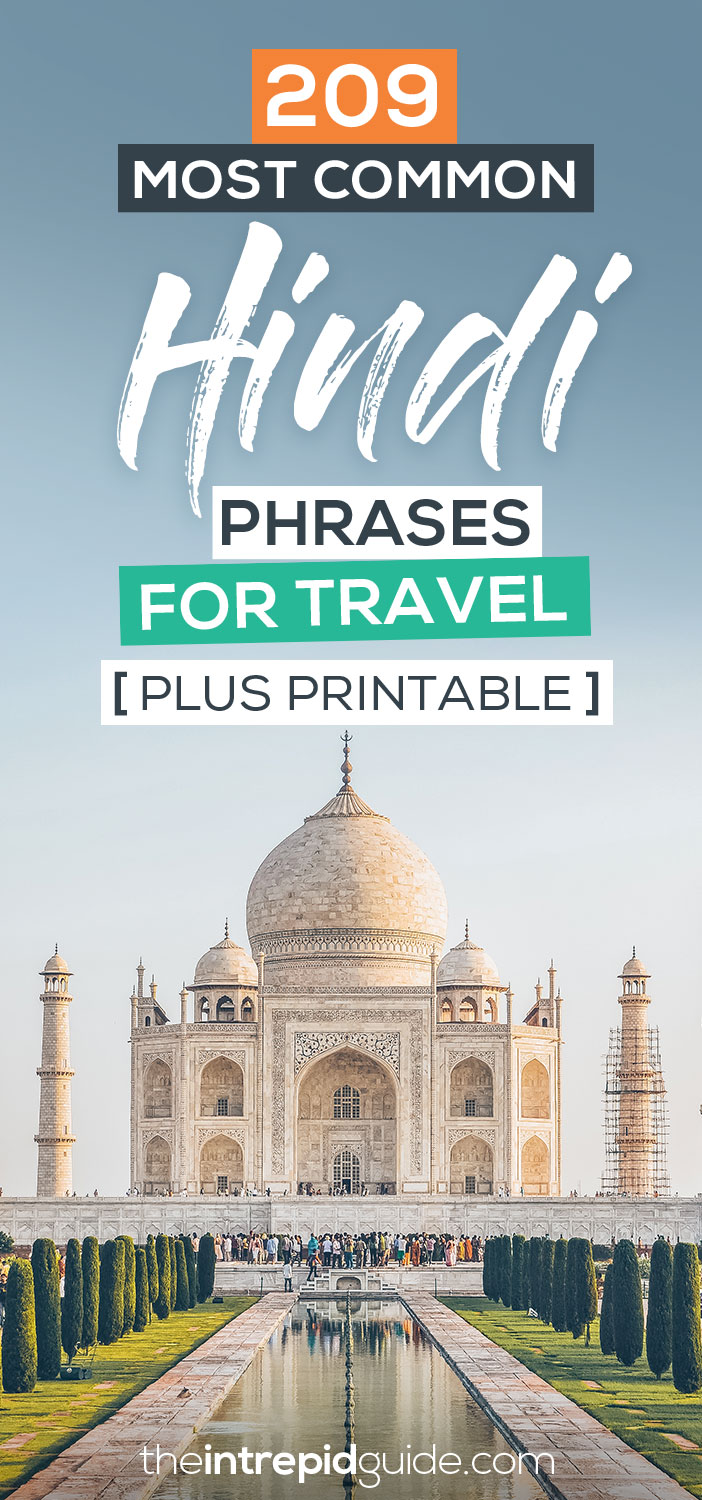
Sources / A big thanks to Babita Craig a professional Hindi teacher based in London. Having trained and taught for nine years at India’s famous Landour Language School, she set up Babita’s School of Hindi, London, in 2019, where she teaches a broad range of students in-person and online.
Want to know more about learning languages? Start here!
- What Type of Language Learner Are You? Your 4-Step Personalised Learning Plan
- 18 Unexpected Advantages & Health Benefits of Learning A Foreign Language
- How to Learn Languages Like Crazy, Even If You Have a Crazy Life [3-Step Method]
- 10 Pro Tips: How to Learn a Language with a Full-Time Job
- 44 Best Movies on Disney Plus for Learning Languages
- 6 Language Learning Tips: How to Learn a Language from Home
- How to Learn Your First Foreign Language in 8 Simple Steps: A Beginner’s Guide
- Essential Travel Phrases: How to be Travel Fluent in 10 Simple Steps
- 7 Reasons Why You Should Go on a Language Holiday
- 20 Top Language Learning Resources You Should Use
- 13 Ways to Seamlessly Integrate Language Learning into Your Daily Life
- 23 Cool Gifts for Language Learners They Will Actually Use and Love
- 11 Life-Changing Reasons Why You Should Learn a Language
- 42 beautiful Inspirational Quotes for Language Learners
- Language learning tips: 11 Polyglots Reveal The Secrets of Their Success
- Top 10 Best Ways to Learn a Language Better and Faster
- How to Learn Italian Before Your Trip
- Free Travel Phrase Guides
- How Many Languages are there in the World?
- Mondly Review: 10 Ways Mondly Drastically Improved My Language Learning
- 78 FREE Dictionaries to Learn a Language Fast [Free eBook Download]
- 22 KEY Travel Phrases That Will Transform Your Travels [Free Guide]
Over to you!
Which of these Hindi phrases did you find the most useful? Let me know in the comments section below or join me on social media to start a conversation.
Thanks for reading and I hope you enjoyed this post.
Like what you see? Subscribe using the form below to have all of my posts delivered directly to your email.

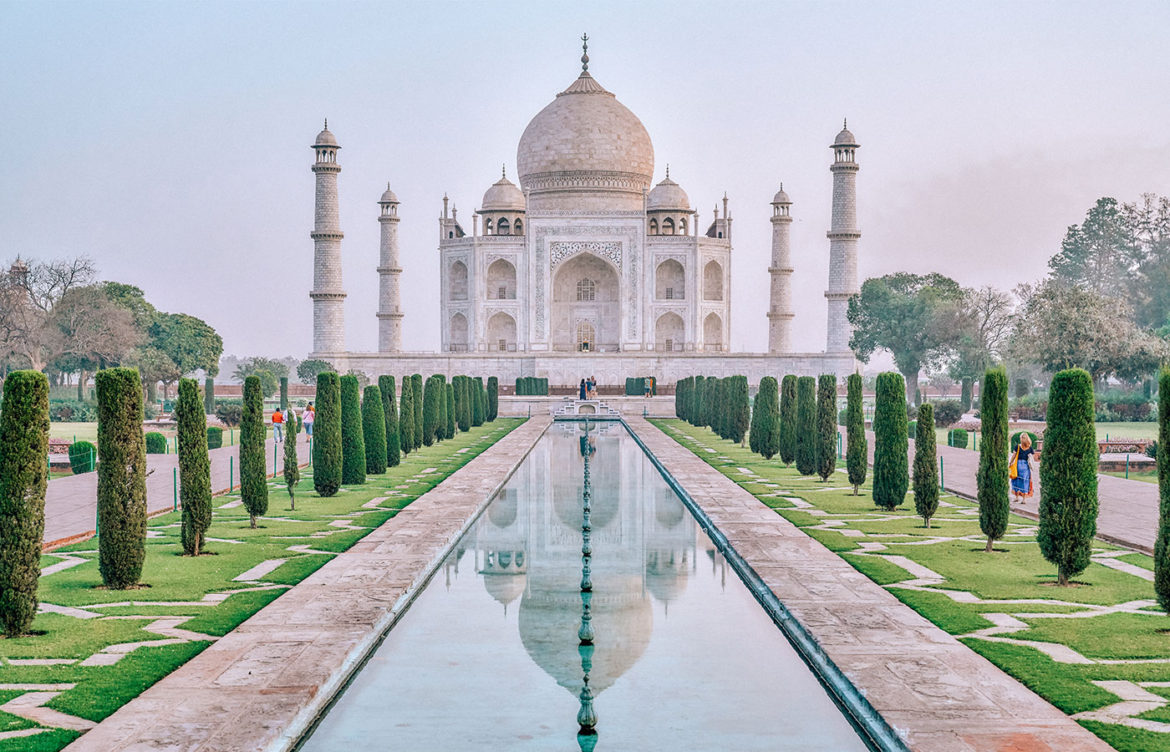
3 comments
I am so excited I found this website, I am chanting mantras and I just met a lady, I gave myself the rest of the year to learn all of this. Thanks you very much Michele for this amazing post, I will help you share and will text you later on your Instagram, Facebook, linked in or any other social I found you, You are fantastic.
Hola, estoy muy pero muy emocionado, encontre esta pagina y justamente estoy recitando mantras y conoci una chica y me he dado lo que resta del año para aprender todo esto. Gracias Michele, Te voy a contactar por la redes porque me interesa mucho tu contenido.
thank u sooo much!!! those phrases are really helpful… thanks a lot
My pleasure :) I’m so glad to hear that.